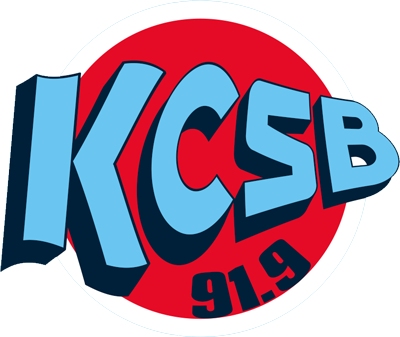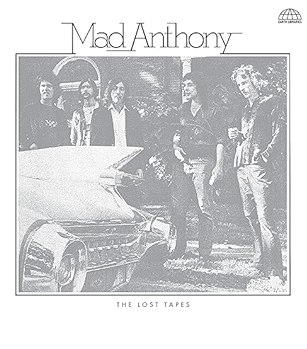September’s Add of the Month: “The Lost Tapes” by Mad Anthony
“The Lost Tapes” by Mad Anthony
Words by Bella Genolio (External Music Director 23′-24′)
As the end of summer approaches and students return to Santa Barbara, it’s nice to slow down and enjoy the sun before the chaos of fall quarter begins. What better way to do so than to kick back and listen to a local Santa Barbara band from almost 50 years ago. The Lost Tapes is pretty lo-Fi, it was recorded in a barn with only one mic for the three singers, but that does not take away from the songwriting on this album. The fuzziness of the album gives it a sense of nostalgia perfect for a late summer listen.
Finding success in Ohio nightclubs in the early 1970’s, the Mad Anthony trio, John K. Schwab, Larry Dotson, and Carl “Mad Anthony” Richards, headed over to California to make their big break. They landed in Santa Barbara where they recorded this set of songs as a demo in hopes of landing a big record deal. Unfortunately, nothing came of this demo and it was mainly unheard, until Schwab’s son Ben (of Drugdealer and Slyvie) persuaded his father to release these songs on the album The Lost Tapes. The story is really quite sweet, Ben kept his father’s tape throughout his songwriting career and would share it with friends and family. You can really hear Mad Anthony’s influence in Ben’s work with Sylvie, he even uses his father’s voice in some of the songs.
The Lost Tapes embodies the sound of 1970s folk so masterfully. Ranging from sunny love songs, to traditional western fingerpicking, to slow melancholic ballads, Mad Anthony impressively encompasses the themes and sounds of this era in a new light. Though the album was not released in the ‘70s, it fits perfectly with the era and allows for folk lovers to experience a new/old sound. Fans of modern folk artists, especially Sylvie and Drugdealer, can appreciate the variation in sound from song to song that this album provides, allowing for a full display of different elements classic folk artists used that modern folk artists incorporate into their music.
The album kicks off with the piano-heavy ballad “Rina.” With a folksy drawl, the lyrics describe a lonely woman, Rina, who spends all of her time making her home perfect – tending to her garden, cleaning her mirror – for a man she has yet to meet. Rina is an outcast, strangers stare at her “twisted body,” others laugh at her and call her dumb, but she continues to wait for her love. Mad Anthony paints a picture of horrible loneliness and impossible love, but does so without criticizing Rina, rather they come from a perspective of sympathy. The chorus of the song uses layered voices to create a heavy, melancholy sound and contrasts it with bright twangy guitar. This seems to suggest hope for Rina, despite the lack of care she feels from everyone around her.
“Nobody Knows,” track three on The Lost Tapes, opens with classic western fingerpicking that sets the theme of the song, transporting the listener to the surroundings of spaghetti westerns: dusty horse filled towns, old darkened saloons, plains that stretch flat and bare with no one around for miles and miles. Despite the western backdrop, the lyrics are haunting and biblical, telling of a murdered prophet and a community suffering from his death. “On a hill we kill the one who takes our hunger,” directly refers to Jesus’ crucifixion and the rest of the song seems to express the guilt and regret for killing the prophet. Many folk artists throughout the 1960s and 1970s incorporated biblical references into their songs, including Bob Dylan, Simon and Garfunkel, and the Byrds. Mad Anthony manages to take a story that nearly everyone has heard and put it in a new western setting.
On “Take Care of Yourself,” the narrator dedicates this track to Richard as a delicate melody opens the song. Soon the keys trickle lightly in and layer over the delicate picking to create a reflective, sweet sound. This track uses a different lead vocalist than the previous songs, his tone heeds warning and holds a sense of melancholy. The lyrics on this song tell a cautionary tale of a man who tried to fulfill his dream but fell short and never tried again. The urgency in the message of this song contrasts the laid back, sunny instrumentation: to take every opportunity presented to you and to look out for yourself and yourself alone. You can really hear the influence Mad Anthony had on the band Sylvie in this song in particular with the instrumentation and vocal style.
Near the end of the album, Mad Anthony adds a sweet, poetic love song, “Babe.” Layered guitars with light fingerpicking create an airy trickling backdrop for this song. “Babe” describes the strength and passion of young love, as well as the freeing feeling of being in love. The narrator promises their love will last as they grow old, destined to “wander through each other’s lives forever.” They fall in love over and over again, grow together as friends and lovers. It’s a really sweet ballad and the fuzziness of the song adds another layer; it’s almost as if the narrator is looking back at a first love and reminiscing.
There’s something really special about this album, it allows the listener to see back into an older era without the interpretation and history of those who listened to it at the time it was released. It serves as a reminder that sometimes art takes a while to be appreciated and that the validation that comes from signing to a big record label or getting to go on tour does not determine the quality of an artist.

